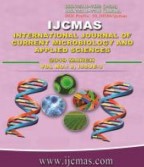


 National Academy of Agricultural Sciences (NAAS)
National Academy of Agricultural Sciences (NAAS)

|
PRINT ISSN : 2319-7692
Online ISSN : 2319-7706 Issues : 12 per year Publisher : Excellent Publishers Email : editorijcmas@gmail.com / submit@ijcmas.com Editor-in-chief: Dr.M.Prakash Index Copernicus ICV 2018: 95.39 NAAS RATING 2020: 5.38 |
Soybean [Glycine max (L.) Merrill] is a legume known for nitrogen fixation interacting with efficient Bradyrhizobium strains. In Côte d'Ivoire, the Bradyrhizobium inoculums used in soybean production is a foreign strain, which requires the search for indigenous strains adapted to Ivorian soils. The present study aimed to isolate and select rhizobial bacteria from soybeans grown on soils sampled from six localities in the central-western region of Côte d'Ivoire. Thirty bacteria were obtained from the nodules of plants grown on soils of two localities that had previously received soybean cultivation (Gonate North and South). These isolates were coded as RSC and identified as being able to genus Bradyrhizobium (slow growth) and Sinorhizobium (intermediate growth) depending on cultural and morphological characteristics. Except for RSC 327 and RSC 330, all isolates were authenticated and were able to nodulate the host plant in controlled culture. The isolates RSC 309, RSC 310, RSC 312, RSC 323, RSC 324, RSC 325 and RSC 326 were efficient and significantly (P <5%) increased the number and weight of the nodules, the height and plant biomass. Moreover, these same isolates also showed a high tolerance to salt (NaCl) added in YEM media at a concentration ranging from 4 to 5%. Based on the symbiotic and physiological characteristics, isolates RSC 309, RSC 310, RSC 312, RSC 323, RSC 324 and RSC 325 could be recommended as the native soybean inoculums under soil and climatic conditions of Côte d’Ivoire.
 |
 |
 |
 |
 |